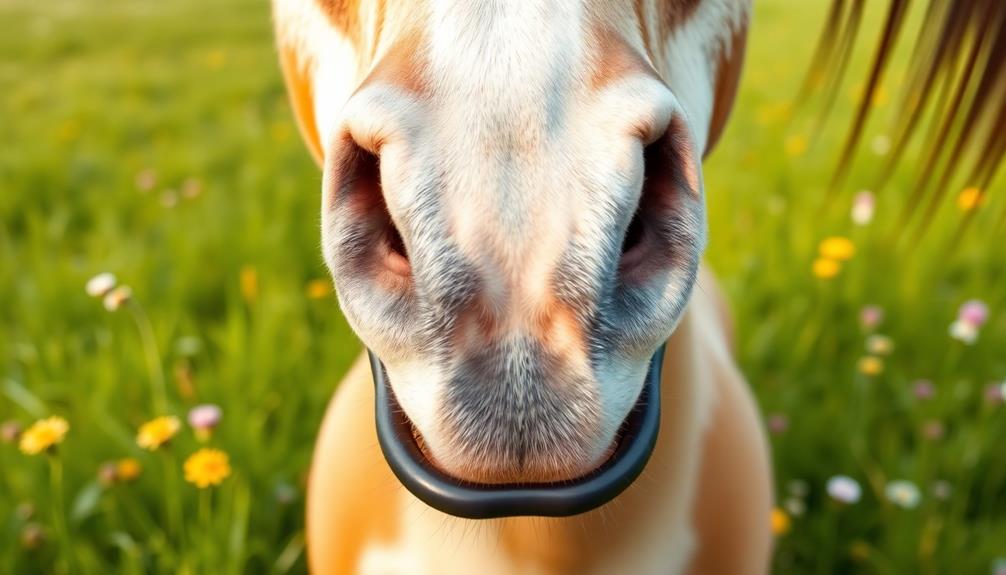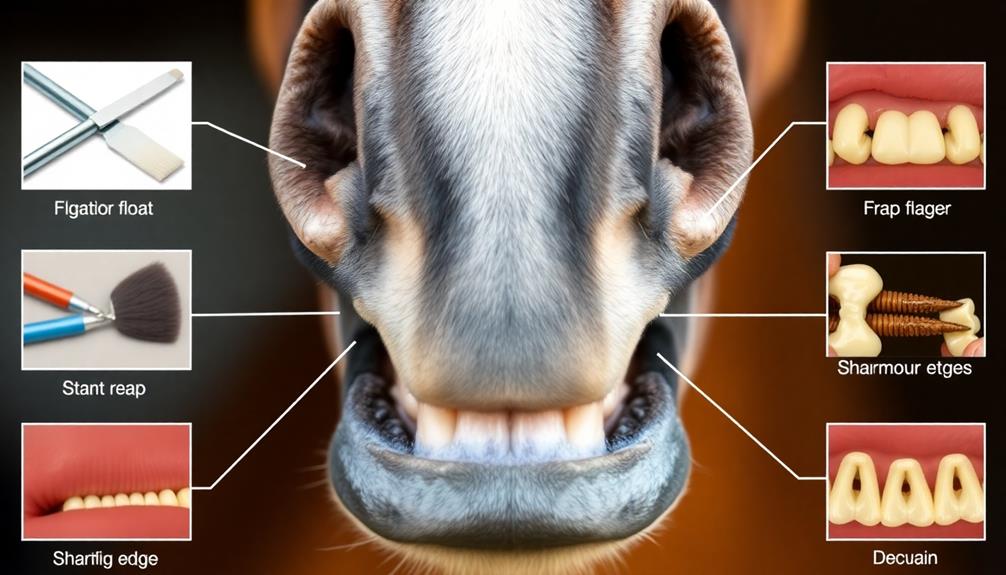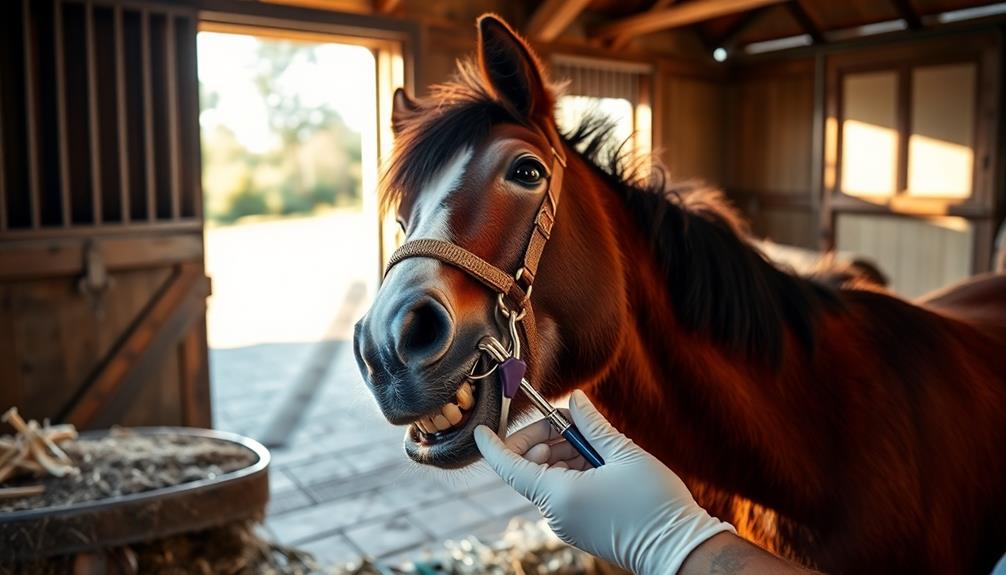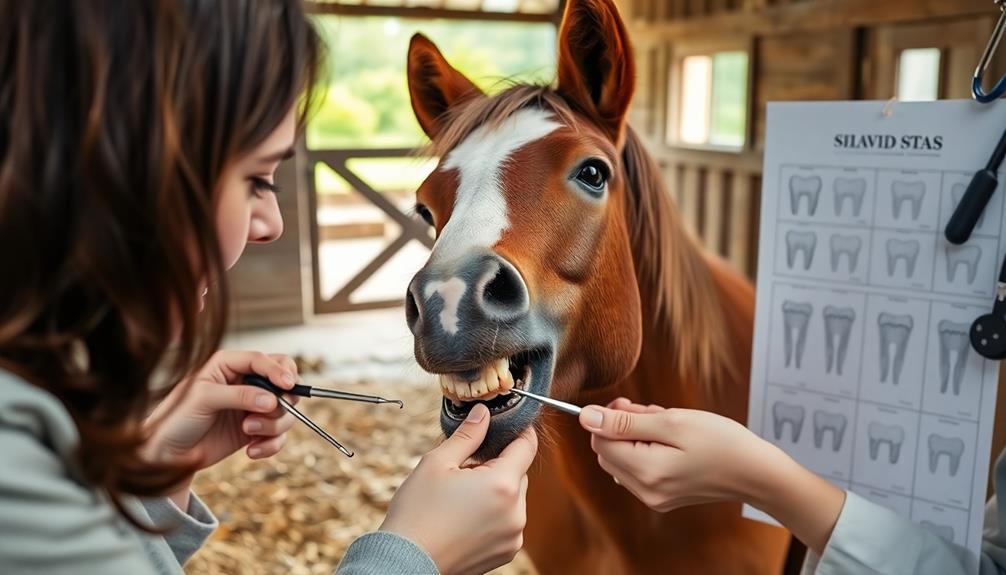Yes, mini horses need their teeth floated regularly to prevent dental issues and guarantee their health. Since their teeth continuously grow, floating smooths out sharp edges and prevents problems like misalignment and retained caps. You should schedule annual check-ups, with some horses needing floating every six months. Pay attention to signs of dental distress, such as dropping food or difficulty chewing, as these can indicate serious issues. Finding a qualified equine dentist experienced with miniature horses is vital for proper care. There's more to discover about keeping your mini horse's teeth healthy and happy, so stay tuned for further insights!
Key Takeaways
- Mini horses require regular dental floating to manage sharp points and prevent discomfort during chewing.
- Annual or biannual dental check-ups are essential for maintaining optimal oral health in mini horses.
- Floating helps address issues like malocclusions and retained caps, ensuring proper alignment of teeth.
- Signs of dental problems include difficulty chewing and excessive salivation, indicating a need for immediate care.
- Choosing a qualified equine dentist familiar with miniature horses is crucial for effective dental treatment.
Understanding Mini Horse Dental Anatomy

When it comes to understanding mini horse dental anatomy, it's important to know that these small equines have between 36 and 44 teeth, just like their larger counterparts. However, their teeth are specially adapted to fit their smaller mouths.
Miniature horses possess hypsodont teeth that continuously grow, requiring regular wear through chewing to keep them at the right length and alignment.
You might notice that mini horses often face dental issues like retained caps (baby teeth) and malocclusions due to their unique jaw size. This makes routine dental checks vital for their well-being.
The softer nature of their teeth compared to larger breeds can increase their susceptibility to dental problems, emphasizing the need for regular dental care.
Understanding the dental development timeline for Miniature Horses helps you monitor their oral health effectively. Keep an eye on when baby teeth emerge and shift to permanent teeth.
This knowledge is significant for preventing and addressing potential issues early on. By paying attention to their dental anatomy, you'll guarantee your mini horse stays comfortable, healthy, and happy.
Importance of Regular Dental Care

Regular dental care is essential for your miniature horse to avoid common issues like sharp points and missing teeth.
Scheduling annual check-ups, or even biannual floating if needed, helps maintain their health and guarantees they can eat comfortably.
Dental Check Frequency
Maintaining your miniature horse's dental health is essential for their overall well-being. Regular dental check-ups should occur at least twice a year, with some horses needing their teeth checked even more frequently.
Miniature horses are particularly prone to dental issues, so it's important to have a qualified horse dentist examine their teeth regularly. During these visits, the dentist will check for sharp points and other problems that can lead to discomfort and eating difficulties.
Floating every horse's teeth helps smooth out any sharp edges, making sure your mini can chew their food without pain. Annual examinations also monitor the wear of adult teeth, which affects jaw alignment and health over time.
If you skip regular dental checks, you risk severe complications like weight loss and nutritional deficiencies, which can greatly impact your horse's quality of life. Proactive dental care is essential to prevent issues like missing teeth or retained caps.
Common Dental Issues
While you may not realize it, miniature horses face unique dental challenges that can greatly affect their health and quality of life. These horses are more susceptible to various dental issues, including sharp points, hooks, and retained caps. Regular dental care is vital to prevent complications that could arise from these problems.
Due to their smaller mouths, miniature horses often need annual check-ups or even biannual teeth floating as they age. Neglecting dental care can lead to severe complications like weight loss and difficulty eating. Sharp teeth can cause pain and discomfort, making it important to monitor their dental health.
Regular examinations help identify issues such as missing teeth or improper alignment, which are common in miniature horses. As an owner, you should be vigilant for signs of dental distress, like dropping food or behavioral changes. Difficulty chewing can indicate the need for professional dental care.
Impact on Health
Neglecting dental care can greatly impact your miniature horse's health and well-being. Mini horses are particularly prone to dental issues like sharp points, hooks, and missing teeth, which can lead to serious complications over the years.
If you don't regularly float their teeth, these problems can worsen, affecting your horse's ability to chew and eat effectively.
Annual dental check-ups are crucial, and some horses may even need care biannually as they age. Without proper dental maintenance, your horse can experience weight loss and discomfort when eating.
Remember, even though miniature horses share the same number of teeth as larger breeds, their smaller mouths make them more vulnerable to dental problems.
Regular check-ups allow for early detection of issues, preventing long-term health complications and costly treatments. Being proactive about dental care guarantees your horse maintains ideal jaw alignment and chewing function, essential for their overall health.
Don't wait for problems to arise—commit to regular dental evaluations to keep your beloved mini horse happy and healthy.
Common Dental Issues in Mini Horses

Mini horses face several dental issues that can affect their health, so it's essential to stay alert.
Regular check-ups help catch problems like sharp enamel points and misaligned teeth early on, preventing discomfort.
Watch for signs like head tossing or reluctance to eat, as these can indicate dental challenges that need attention.
Frequent Dental Problems
Dental problems often crop up in miniature horses due to their unique anatomy and smaller mouth size. These little equines are more prone to dental issues than their larger counterparts. Common problems include sharp enamel points and hooks that can develop from misalignment.
Retained caps, or baby teeth that don't fall out as they should, can also disrupt the alignment of adult teeth, leading to further complications.
As your miniature horse ages, you might notice permanent gaps from worn-out adult teeth. It's vital to monitor the opposing teeth to prevent overgrowth, which could result in serious issues. You should keep an eye out for signs of dental discomfort, like difficulty eating, dropping food, or unusual behavior like head tossing. These are indicators that it's time for a dental evaluation.
To maintain your mini horse's oral health, regular dental care is necessary. Floating your horse's teeth helps smooth out sharp edges and addresses existing problems before they escalate.
Importance of Regular Check-ups
Regular check-ups are essential for keeping your miniature horse's dental health in top shape. These little equines are more prone to dental issues, including sharp points, hooks, and missing teeth. To prevent serious dental problems, you should have them checked every year. Annual dental exams help identify issues early, ensuring your mini horse can chew and eat comfortably.
The following table highlights common dental problems to watch for during check-ups:
| Dental Issue | Description |
|---|---|
| Retained Caps | Baby teeth that don't fall out as they should |
| Jaw Growth Issues | Discrepancies that can lead to undershot jaws |
| Tooth Wear | Quicker wear due to smaller mouths |
Signs of Dental Issues
Recognizing the signs of dental issues in your miniature horse is essential for maintaining their overall health. Mini horses are particularly susceptible to dental problems like sharp points, hooks, and retained caps, which can lead to discomfort and poor chewing efficiency.
Keep an eye out for common signs of dental issues, such as dropping food, difficulty chewing, excessive salivation, and changes in appetite. These symptoms often indicate the presence of sharp points or misalignment.
Behavioral changes can also signal underlying dental problems. If your mini horse starts tossing its head or shows reluctance to accept a bit, it's time for a veterinary or dental examination. Missing teeth can exacerbate these issues, causing food to pack in their mouths and increasing the risk of periodontal disease.
Regular dental check-ups are important to catch these problems early. Untreated dental issues can result in significant health complications over time.
Recommended Dental Care Practices

Guaranteeing your miniature horse has proper dental care is vital for their overall health and well-being. Regular check-ups are essential; you should have your horse's teeth done at least once a year, with some requiring floating every six months due to their susceptibility to dental problems. For younger horses, under five years old, more frequent evaluations are necessary to monitor their adult teeth development.
Here's a quick overview of recommended dental care practices:
| Dental Care Practice | Frequency |
|---|---|
| Regular dental check-ups | Annually |
| Floating if needed | Every six months |
| Young horses' evaluations | Every 3-4 months |
| Appointment with equine dentist | As recommended based on age |
| Monitoring for discomfort signs | Ongoing |
Utilizing a specialized equine dentist guarantees that your miniature horse receives the best possible care. They have the expertise to identify and address unique dental challenges. By staying vigilant and proactive, you can help prevent serious dental issues from developing, keeping your mini horse healthy and happy.
Signs Your Mini Horse Needs Floating

Many miniature horse owners mightn't realize that these small equines can show specific signs when they need dental floating. It's vital to pay attention to your mini horse's behavior, as dental issues can lead to discomfort and health problems.
If you notice your mini horse having difficulty chewing or dropping food while eating, these are clear signs that their teeth may need attention. Excessive salivation can also indicate dental distress, along with changes in appetite or behavior, such as head tossing. These behaviors suggest that your mini horse might need floating to correct sharp points or uneven wear on their teeth.
Additionally, watch for signs of discomfort like tilting their head or spitting out partially chewed hay. Retained baby teeth and dental misalignments are common in mini horses, so regular dental care is necessary.
Many of these little ones need floating every six months, especially as they age or consume softer feed diets. Keeping a close eye on these signs will help guarantee your mini horse maintains ideal dental health and prevents more serious complications down the line.
Choosing the Right Equine Dentist

Finding the right equine dentist for your miniature horse is essential for maintaining their dental health. You should prioritize dentists with specialized experience and training in treating smaller equines, as their dental anatomy differs from larger breeds.
Look for those who offer thorough dental exams and floating services, as routine care is crucial for preventing common dental issues in miniature horses.
Make certain the dentist utilizes appropriate sedation methods tailored to your horse's size and weight, guaranteeing comfort and safety during procedures. It's also important to verify that they employ both hand tools and power tools effectively. The choice of tools can greatly impact the quality and safety of the care provided.
To find a reputable equine dentist, consider seeking recommendations from fellow horse owners or veterinarians. A proven track record with miniature horses can give you confidence in their expertise.
Frequently Asked Questions
How Often Do Mini Horses Need Their Teeth Floated?
Mini horses typically need their teeth floated every 6 to 12 months. If you notice dental issues or as your horse ages, more frequent visits might be necessary to guarantee their comfort and health.
Is Floating a Horse's Teeth Necessary?
Think of a well-tuned piano; without regular tuning, it sounds off. Floating a horse's teeth is necessary to keep their mouth in harmony, ensuring they eat comfortably and maintain overall health. Don't skip those check-ups!
Do Mini Horses Need Mineral Blocks?
Yes, mini horses need mineral blocks to guarantee they get essential nutrients. Choosing the right blocks helps prevent deficiencies, and offering them free-choice lets your horse self-regulate their intake based on individual needs.
Do Mini Donkeys Need Their Teeth Floated?
Think of your mini donkey's teeth like a well-tuned piano—regular floating keeps them harmonious. Yes, they need their teeth floated to prevent discomfort and guarantee they chew properly, so schedule those dental check-ups!
Conclusion
Just like a well-tuned instrument, your mini horse's dental health is essential for harmony in their overall well-being. Regular dental care, including floating, keeps their smiles bright and their spirits high. By being attentive to signs of dental issues, you're not just caring for their teeth; you're nurturing their happiness and energy. Remember, a healthy mouth leads to a joyful heart, and your mini horse deserves to trot through life with ease and grace.










